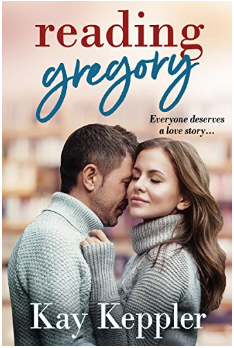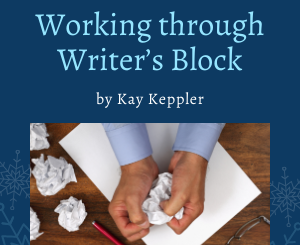Novelists, Don’t Go It Alone: Try a Critique Group by @KayKeppler
 Let’s welcome back monthly columnist, editor, and novelist, Kay Keppler, as she shares with us “Don’t Go It Alone.” Enjoy!
Let’s welcome back monthly columnist, editor, and novelist, Kay Keppler, as she shares with us “Don’t Go It Alone.” Enjoy!
***
Most people think of writing as a solitary occupation, and it is.
Writers work alone, staring down the terrors of the blank page.
It’s often hard to know if what you’re writing is decent or dreck. Sometimes you might be too frozen to write at all. That’s where community can help.
Try a Critique Group
Critique groups can be an enormous help in helping you see what works and what doesn’t. Members can point out passages that aren’t logical or don’t flow, where the pacing falls off or the characterizations go out of kilter. They can highlight grammar mistakes or syntax issues.
I’m in a critique group that I love. Three of us meet monthly usually to critique or sometimes to brainstorm. The meetings are productive and energizing, and the monthly meeting keeps us accountable, too. About my pages, one person usually says, “It needs more emotion! I want to know how she feels!” And the other says, “This part just doesn’t make sense.”
I love it when that happens.
But Exercise Caution
Alas, not all critique groups are created equal. Michael Hauge divides critique groups into four basic categories.
They help you:
1. Use any excuse not to write, which gets you out of the house, but has no effect on your writing or productivity
2. Feel good, which bolsters your spirits and avoids hurt feelings, but prevents you from facing your weaknesses and improving your craft
3. Suffer criticism early and often from members who are clueless about story, which strokes participants’ egos by suggesting changes that are neither well-founded nor consistent with your vision for your story
4. Improve your writing
If you’re in a critique group that falls into categories one to three, maybe it’s time to get out. At the very least, it’s time to steer it in a more productive direction. You need people who support and help you, not coddle you or tear you down.
What can the members of a critique group do to strengthen each other?
Ask questions
Listen to your fellow authors. They have a vision for their projects. Find out what the vision is, then offer suggestions that will help them get to where they want to go.
Ask them about their protagonists—their goals, how they’ll change. Ask about the setting and how it affects the characters. And so on.
You should know these stories and characters almost as well as you know your own.
Listen to the answers
Figure out what lies underneath the answer. Press the writers to explain their choices.
Point out where the writer’s vision and execution don’t connect
Sometimes what you read in the selected pages might seem inconsistent with what the writers say they want to do. Clarify with the writer what the story goal is.
Perhaps some story elements diminish your emotional involvement or leave you confused, disbelieving, or bored.
Members of the group should emphasize that they’re reacting emotionally to the work, and say why.
An emotional response to anything is always legitimate, whether the reader can explain it or not.
After That, Offer Suggestions
When the group has listened to the writer’s goals and vision, and pointed out their emotional reactions, they can help the writer brainstorm ways of addressing the issues. Work to improve the story and heighten its emotional impact. The idea is to search for the idea that the writer feels is best for the story she wants to tell.
Be kind. Be open.
When you talk about another’s work, be honest, but be kind. Think how the remarks would feel if they were directed at you.
And if you’re on the receiving end of a detailed critique, remember that truly hearing criticism isn’t easy.
Try to listen and respond with openness, trusting that those who offer their opinions want to help. Do your best not to be defensive, but be sure you understand the basis of their remarks.
When you don’t understand a comment, ask for an explanation. If you think someone missed something, say, “I thought I addressed that issue when I wrote _______ . Do you know why that didn’t work for you? Did anyone else in the group have the same reaction?”
Challenging every comment and suggestion is unproductive, but be sure you understand where people are coming from. Then lead the brainstorming.
When you hear suggestions you don’t like, say, “That change doesn’t really work for me because _______. But what if I try_______ instead?”
Keep It Small
Keeping your group small means that each member:
- Gets quality discussion time
- Learns each member’s project thoroughly
In a large group, you might hear so many conflicting opinions that nothing stands out. And in a large group, if discussions are thorough, your meetings will run long. Maybe very long.
Join the Fun
If your critique group is already terrific, wonderful. If it isn’t—if it doesn’t provide the sounding board you need for your work—maybe some of these techniques will improve its dynamic.
***
Editor’s Note: I am one of Kay Keppler’s other two critique partners.
***
ABOUT THE AUTHOR
Kay Keppler is an author Zero Gravity Outcasts, Betting on Hope, Gargoyle: Three Enchanting Romance Novellas, and editor of fiction and nonfiction –Angel’s Kiss and Outsource It!
is an author Zero Gravity Outcasts, Betting on Hope, Gargoyle: Three Enchanting Romance Novellas, and editor of fiction and nonfiction –Angel’s Kiss and Outsource It!
She lives in northern California. Contact her here at Writer’s Fun Zone in the comments below, or at kaykeppler@yahoo.com to ask questions, suggest topics, or if you prefer, complain.







Hi Kay: A very interesting and informative Post. Lots to keep in mind when I get to the point that I reach out to others by asking them to collaborate with me and offering to collaborate with them within the context of a critique group. I especially want to remember your words, “An emotional response to anything is always legitimate, whether the reader can explain it or not.” Thanks again for sharing your knowledge, wisdom and time!
Beth Barany, thank you ever so for you post.Much thanks again.